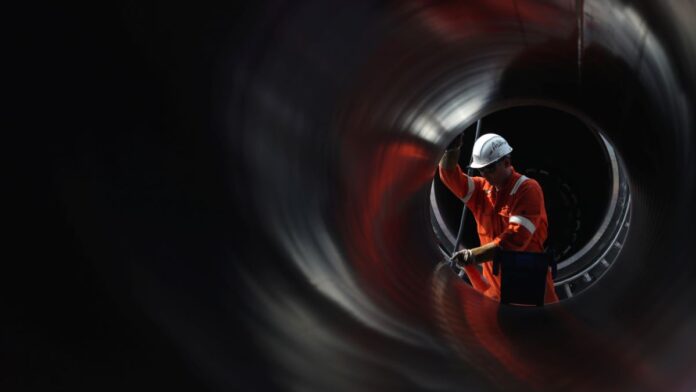
The Kremlin said on September 16 that there should be no connection between the Nord Stream 2 gas pipeline from Russia to Germany and the case of opposition leader Aleksei Navalny, who Berlin says was poisoned in Russia with a nerve agent.
Germany has been one of Nord Stream 2’s biggest proponents, but Chancellor Angela Merkel’s coalition government has been facing calls to halt the pipeline over Navalny’s poisoning if Moscow doesn’t cooperate with a transparent investigation.
Navalny suddenly fell ill on a Russian domestic flight on August 20 and was medically evacuated to Germany, where a military laboratory found the anti-corruption campaigner had been poisoned with a Soviet-style military nerve agent from the Novichok group.
Laboratories in Sweden and France concurred with the German doctors’ conclusions.
Kremlin spokesman Dmitry Peskov said during a conference call with reporters that Nord Stream 2 should not be raised when discussing the Navalny case.
“It should stop being mentioned in the context of any politicization,” Peskov said. “This is a commercial project that is absolutely in line with the interests of both Russia and European Union countries, and primarily Germany.”
Ukraine and EU members Poland, Estonia, Latvia, and Lithuania are opposed to Nord Stream 2, and the United States has sought to halt the project with sanctions that have infuriated European capitals.
Russian authorities have refused to open a criminal investigation into the Navalny case, saying that no hard evidence of poisoning has been found, but Peskov reiterated that Moscow was hoping to cooperate with Germany on the case, although its efforts to do so had so far been rebuffed.
“What happened to the Berlin patient needs… investigation and clarification,” Peskov said, referring to Navalny. “To move forward on this investigation and clarify the circumstances, cooperation with Germany is essential, first and foremost. Russia is seeking this cooperation but has not been met with reciprocity.”
The Nord Stream 2 project, which will double the capacity of the existing Nord Stream 1 pipeline from Russia to Germany, is more than 90 percent complete and scheduled to operate from early 2021.
On September 15, Austria said it still supports Nord Stream 2, despite growing reservations about the project following Navalny’s poisoning.
President Alexander Van der Bellen said there should be no connection between the Navalny case and Nord Stream 2.
Austria’s OMV is one of the European companies in the consortium involved in financing the $11 billion pipeline.
Separately, Russian Finance Minister Anton Siluanov complained that talk of possible sanctions over the Navalny case was affecting its plans to borrow money on international markets, acknowledging the risk of harmful economic fallout from his poisoning.
Siluanov on September 16 said Moscow was waiting for an opportunity to tap the Eurobond market, but would not do so with the threat of sanctions hanging over it.
“All these restrictions, sanctions, and hype around Navalny do not give us confidence in a good placement,” he said.
Moscow is looking for additional sources of funding to bridge a budget gap caused by lower oil prices and the COVID-19 pandemic.
